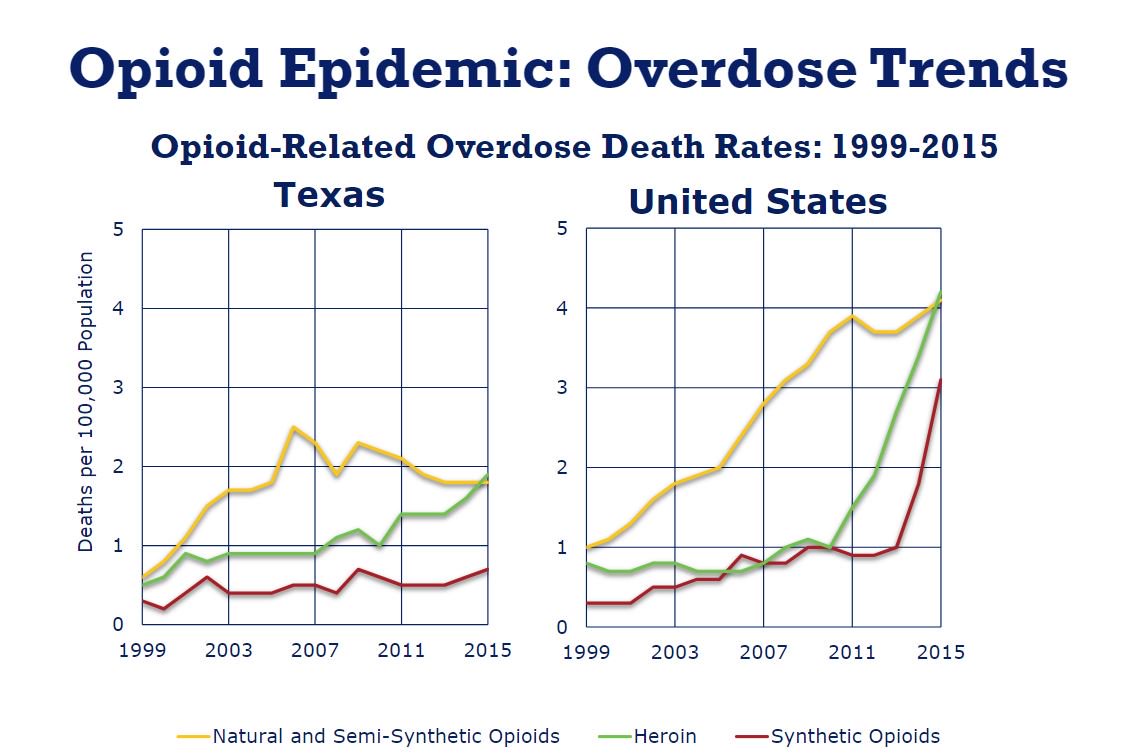Let's do a quick overview of substance abuse resources in Texas, then try to answer a couple of questions raised by the Texas District and County Attorneys Association on their Twitter feed.
For starters, funding for substance abuse in Texas comes primarily from two sources: Medicaid and TDCJ. Between them, those two sources account for 97.4 percent of all government substance-abuse funding in the state, split roughly equally, reported LBB. Just more than $386 million are spent on SA treatment through Medicaid, while around $343 million is spent on treatment through TDCJ.
The difference, though, is where state money is spent. Overall, 58 percent of funds spent on substance abuse come from state general revenue coffers. But most of that is spent on treatment in corrections environments. Overall, state general revenue funds pay for only 24 percent of Medicaid expenditures on substance abuse, but more than 98 percent of treatment funds at TDCJ.
With a total incarcerated population of 145,399, TDCJ has 10,047 incarceration beds dedicated to substance abuse, and the parole system has 7,592 people on specialized substance abuse caseloads.
There are another 2,897 secure treatment beds used by the probation system, TDCJ reported.
 |
| Source: Meadows Foundation |
Treatment admissions for alcohol, cocaine/crack, and opiods have declined in recent years, while admissions for heroin and meth have been rising. Overwhelmingly, the largest number of admissions were for alcohol.
 |
| Source: TX HHSC |
Certainly, people without access to healthcare have a tougher time getting addicted to prescription opiods, and Texas has among the highest uninsured rates in the country. Moreover, while not approaching spikes seen in some states, overdose deaths attributable to opiods and heroin have more than doubled since the turn of the century, according to the HHSC graphic cited.
But really, the comment mainly just ignores the fact that drug use differs regionally and Texas addicts still tend to favor meth over heroin. This fact has historical roots. When Texas clamped down regulating legal antihistamines used by addicts to cook meth, Mexican drug cartels took over the trade and began pumping truckloads of cheap speed into the state to fill the gap in the market. Meth prices plummeted while addiction and overdoses increased. So it's not so much that Texas is "faring better" as that the state's patterns of addiction aren't the same as in Ohio and Pennsylvania. According to the Addiction Research Institute at the UT-Austin School of Social Work, "There were 715 deaths due to methamphetamine in Texas in 2016, as compared with 539 due to heroin."
Tack on those deaths, and all of a sudden Texas isn't so much "faring better" than "faring differently."
Moreover, the Addiction Research Institute gave the best explanation for why Texas hasn't seen as many opiod deaths as in the Northeast, and it's not because of law enforcement efforts but because of differences in the market: " Texas has not yet suffered the epidemic of overdoses seen in the northeast because the heroin in Texas is Mexican Black Tar which cannot easily be mixed with fentanyl. The purity of Black Tar is 45%-50% as compared to 80%-85% purity for Mexican-South American heroin in the northeast."
So the answers to TDCAA's questions are, 1) "We aren't faring better, our problems are just different," and 2) "Market trends among cartels, not Texas policy, account for the different overdose patterns. Since neither Texas policy nor the 'performance' of law enforcement is responsible for the lower number of opiod deaths, there's no policy implied that would 'sustain or improve that performance.'" This is not a Texas-does-it-better issue, it's an all-problems-are-local issue.


.jpg)
4 comments:
"TDCAA on its Twitter feed linked to a chart showing opiod deaths in Texas happen at a lower rate than nationally, and would like to credit law enforcement efforts."
Scott, you know you made up this bolded part out of whole cloth, don't you? Nowhere do we make that claim, nor (as you seem to impute to us later) that "the 'performance' of law enforcement is responsible for the lower number of opioid deaths." Please don't put words in our mouth.
FTR, we are favorably inclined to your "meth use > opioid use" theory in Texas, and we hope the committee explores that further. These are areas worthy of inquiry and open-minded research; feel free to leave the baggage at home before taking that trip.
Shannon, the idea that you WEREN'T implying that is just silly, but you're welcome to pretend if you want. Just know everybody else sees through it.
Also, if you're "favorably inclined" to my analysis, then you already knew that your "what is TX doing right?" question on Twitter was disingenuous to begin with, which is why it's so obvious you're trying to give TX LEOs credit for achievements they had nothing to do with.
Whoa. I had no idea the paranoia ran so deep. Sorry for trying to find common ground. My mistake, obviously.
¯\_(ツ)_/¯
What is the deal with prosecutors? For years anyone daring to disagree is immediately confronted. They need to clean up their own homes before looking to discredit others, oh wait, that is their job...
Post a Comment